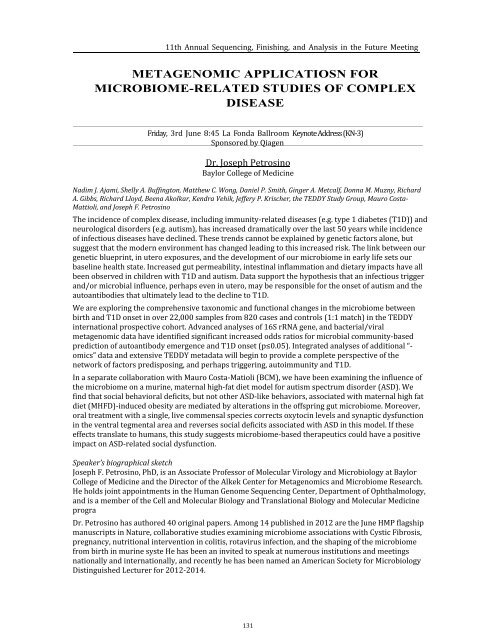Sequencing
SFAF2016%20Meeting%20Guide%20Final%203
SFAF2016%20Meeting%20Guide%20Final%203
Create successful ePaper yourself
Turn your PDF publications into a flip-book with our unique Google optimized e-Paper software.
11th Annual <strong>Sequencing</strong>, Finishing, and Analysis in the Future Meeting<br />
METAGENOMIC APPLICATIOSN FOR<br />
MICROBIOME-RELATED STUDIES OF COMPLEX<br />
DISEASE<br />
Friday, 3rd June 8:45 La Fonda Ballroom Keynote Address (KN‐3)<br />
Sponsored by Qiagen<br />
Dr. Joseph Petrosino<br />
Baylor College of Medicine<br />
Nadim J. Ajami, Shelly A. Buffington, Matthew C. Wong, Daniel P. Smith, Ginger A. Metcalf, Donna M. Muzny, Richard<br />
A. Gibbs, Richard Lloyd, Beena Akolkar, Kendra Vehik, Jeffery P. Krischer, the TEDDY Study Group, Mauro Costa‐<br />
Mattioli, and Joseph F. Petrosino<br />
The incidence of complex disease, including immunity‐related diseases (e.g. type 1 diabetes (T1D)) and<br />
neurological disorders (e.g. autism), has increased dramatically over the last 50 years while incidence<br />
of infectious diseases have declined. These trends cannot be explained by genetic factors alone, but<br />
suggest that the modern environment has changed leading to this increased risk. The link between our<br />
genetic blueprint, in utero exposures, and the development of our microbiome in early life sets our<br />
baseline health state. Increased gut permeability, intestinal inflammation and dietary impacts have all<br />
been observed in children with T1D and autism. Data support the hypothesis that an infectious trigger<br />
and/or microbial influence, perhaps even in utero, may be responsible for the onset of autism and the<br />
autoantibodies that ultimately lead to the decline to T1D.<br />
We are exploring the comprehensive taxonomic and functional changes in the microbiome between<br />
birth and T1D onset in over 22,000 samples from 820 cases and controls (1:1 match) in the TEDDY<br />
international prospective cohort. Advanced analyses of 16S rRNA gene, and bacterial/viral<br />
metagenomic data have identified significant increased odds ratios for microbial community‐based<br />
prediction of autoantibody emergence and T1D onset (p≤0.05). Integrated analyses of additional “‐<br />
omics” data and extensive TEDDY metadata will begin to provide a complete perspective of the<br />
network of factors predisposing, and perhaps triggering, autoimmunity and T1D.<br />
In a separate collaboration with Mauro Costa‐Matioli (BCM), we have been examining the influence of<br />
the microbiome on a murine, maternal high‐fat diet model for autism spectrum disorder (ASD). We<br />
find that social behavioral deficits, but not other ASD‐like behaviors, associated with maternal high fat<br />
diet (MHFD)‐induced obesity are mediated by alterations in the offspring gut microbiome. Moreover,<br />
oral treatment with a single, live commensal species corrects oxytocin levels and synaptic dysfunction<br />
in the ventral tegmental area and reverses social deficits associated with ASD in this model. If these<br />
effects translate to humans, this study suggests microbiome‐based therapeutics could have a positive<br />
impact on ASD‐related social dysfunction.<br />
Speaker’s biographical sketch<br />
Joseph F. Petrosino, PhD, is an Associate Professor of Molecular Virology and Microbiology at Baylor<br />
College of Medicine and the Director of the Alkek Center for Metagenomics and Microbiome Research.<br />
He holds joint appointments in the Human Genome <strong>Sequencing</strong> Center, Department of Ophthalmology,<br />
and is a member of the Cell and Molecular Biology and Translational Biology and Molecular Medicine<br />
progra<br />
Dr. Petrosino has authored 40 original papers. Among 14 published in 2012 are the June HMP flagship<br />
manuscripts in Nature, collaborative studies examining microbiome associations with Cystic Fibrosis,<br />
pregnancy, nutritional intervention in colitis, rotavirus infection, and the shaping of the microbiome<br />
from birth in murine syste He has been an invited to speak at numerous institutions and meetings<br />
nationally and internationally, and recently he has been named an American Society for Microbiology<br />
Distinguished Lecturer for 2012‐2014.<br />
131


